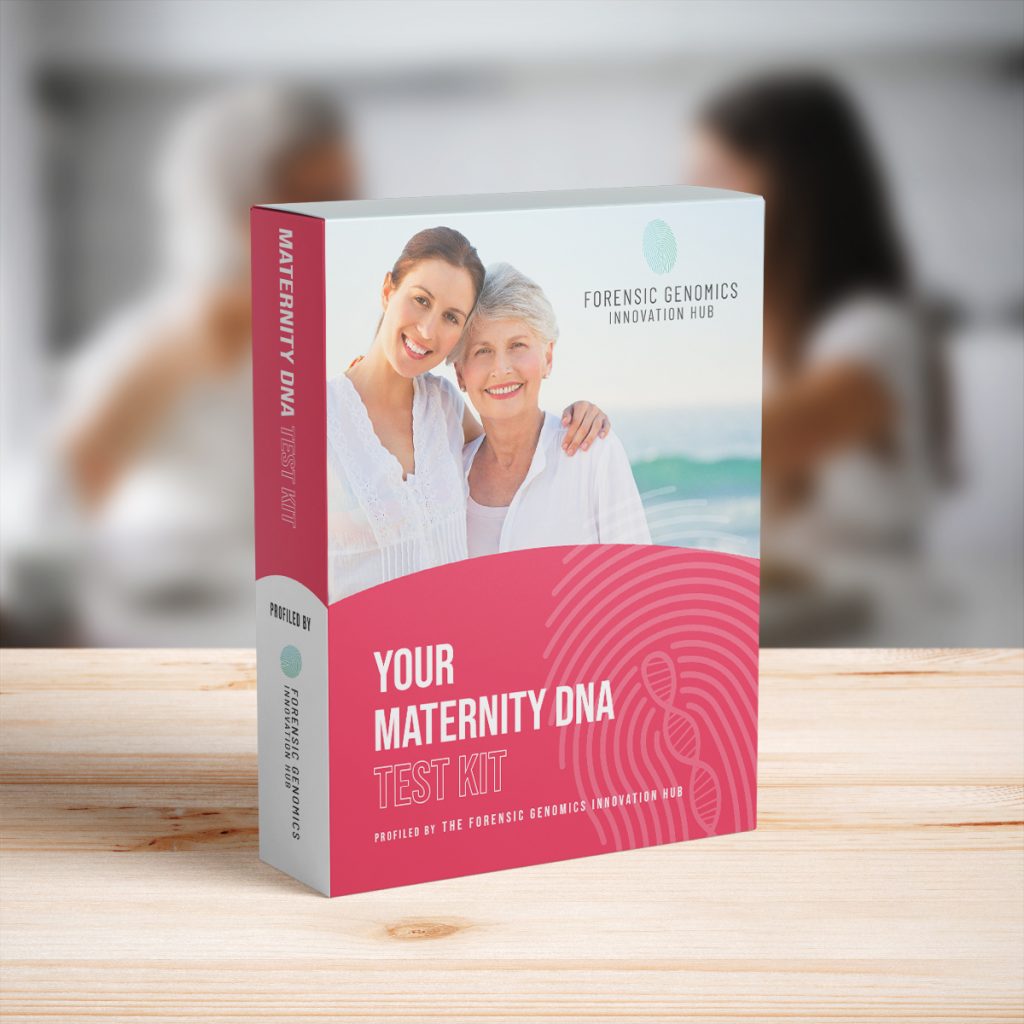What is DNA?
DNA (Deoxyribonucleic Acid) is the molecule in the body that carries our genetic code and makes us who we are. We inherit half our DNA from our biological mother and half from our biological father. Each person inherits a unique mixture of our parents DNA which ,with the exception of identical twins, makes each of us genetically different.
What Is a maternity DNA test?
It tests whether a woman is the biological mother of a child by comparing the DNA of a child with the DNA of an alleged mother. DNA is present in almost all of our cells, including those lining the inside of our mouth. Simply rubbing the inside of the mouth with a swab transfers some of those cells onto the swab. The laboratory extracts the DNA from the swab and the test can be conducted.
How does a maternity test work?
Children inherit half their DNA from their biological mother and half from their biological father. Our DNA test analyses 24 DNA locations across our genome. We analyse and compares the DNA of the child to that of the alleged mother tested to determine whether the DNA of the child was inherited from the alleged mother. This assists in determining the likelihood that a woman is the biological mother of a child. The test will result in either a woman matching a child with a probability of maternity of over 99.9% or it will exclude them completely.
Can maternity testing be done without a sample from the father?
Yes, the DNA profiles of only the child and the alleged mother can be compared when the father is not available, but if a close female relative of the alleged mother could also be suspected as the child’s biological mother then the father’s sample is necessary to be completely sure of the true biological mother.
Why does testing test the father help in maternity testing?
Although a sample from the father is not a necessity for a maternity test, it can be advisable to include him if possible. As a child inherits half it’s DNA from a mother and half from the father seeing the DNA contribution from both the father and alleged mother increases the certainty of maternity. It will result in a more conclusive result.
What DNA samples can be used?
A swab from inside the mouth is all that is needed as DNA is found in our cells that line the surface of the mouth. No other samples will be accepted for this maternity test. You must use the swabs contained in the sampling kit you will receive. The sampling is quick, non-invasive and painless.
What is a peace of mind maternity test?
This is a test that is run for your own information. You collect the swabs at home at a time convenient for you. You post the swabs back to our laboratory for analysis and we will email the report to you. The postage for sending the kit to you, and for sending the samples back to the laboratory is all included in the cost of the test.
This test is exactly the same test that is run for the peace of mind paternity test. Legal paternity and maternity tests can be required for court purposes, the only difference being that the sample has not been sampled by someone impartial, who can verify the identification of the individuals sampled. This is a critical requirement for any test report to be used in court.
Please note that whilst you are solely responsible for home sampling it is still a legal requirement that someone with parental/legal guardian responsibility for children under 16 must sign consent to the child’s sample being taken at home.
How soon after birth can a maternity test be done on a baby?
It can be done immediately after birth. Taking a swab from the inside of the baby’s mouth is totally harmless, painless, non-invasive and quick.
What is in the Maternity Test kit?
- Instructions For Use
- A Sample Consent Form
- The required number of;
- sterile swabs
- microtubes
- barcodes
- protective pouches
- Prepaid Royal Mail Tracked 24 tamperproof return box
How do I take the sample?
The Instructions For Use included in the kit detail everything to assist you in taking a mouth swab. It is very straightforward, painless and quick. The most important thing to remember is NOT taking the swab within 30 minutes of eating or drinking. Food or drink residue can result in poor quality DNA and a new sample may be requested.
How soon will the results be ready?
The Forensic Genomics Innovation Hub aims to have all samples for peace of mind maternity testing received back at the laboratory before 10am on a working day resulted by the end of the next working day. Those received after 10am will be received within 3 working days.
If a swab does not contain sufficient or adequate quality DNA the result may be delayed as we may need to request another sample.
The results will be emailed to the email address provided when purchasing the test. A secure code will be sent via text message in order to open the report.
Are the home sampling kits discreet?
Yes our kits are posted out in plain grey or white plastic envelopes with no branding on them.
How do I go about doing the Maternity DNA test?
Order and pay for a test kit online. A kit will be shipped to you 1st class via Royal Mail. When you receive the kit follow all the instructions carefully and post the samples back to the laboratory in the prepaid tamperproof box.
How do I arrange for an at home DNA test?
Click HERE to take you to the online link to order your test. Everything you need take the samples will be sent out to the address of your choice.
What happens to my DNA samples after testing?
The samples are destroyed after THREE months unless we are otherwise prior instructed in writing or the samples relate to a case where we have been notified of possible fraudulent activity. All other confidential documentation will be destroyed after TWELVE months unless we are otherwise instructed. All DNA profiles retained for up to 6 years.
How much does it cost?
£99 for an at home DNA maternity test between an alleged mother and child. There are no additional charges for an electronic full report. The report will include each individual’s DNA profile and all the associated statistical calculations. There are no additional charges for the rapid turnaround time of next day results where possible.
The only additional charge is if the father’s sample is to be included. This will be an additional £50. A father, mother and child will cost £149. All postage costs are included in these costs.
What if the potential mathers are related?
If the potential mothers are sisters, or mother and daughter, then we strongly advise that the father provide a sample for testing to obtain a conclusive result. Assigning of the biological father’s DNA contribution in the child makes the test statistically more conclusive.
Can a result be inconclusive?
The test used at the Forensic Genomics Innovation Hub has an extremely high power of discrimination between individuals, therefore it is rare that an inconclusive result will be obtained. However, where the possible mothers are close relatives there is a chance of an inconclusive report if the father, or both possible mothers is/are, not tested. Either sample can be “added in” at a later date at a cost of £50, but a report can only be issued once a conclusive result is obtained.
It is also possible that one individual has a slight variant in one or two of the markers tested which occurred at conception, but means they do not match the other individual. Whilst this should not affect the probability of maternity, when both parents are tested, it can result in reduced confidence in the probability of maternity, when only mother and child are tested. This would result in the father being requested or if this is not an option further DNA markers can be analysed at an additional cost.
Can you use a DNA ancestry test to prove maternity?
An ancestry DNA can identify potential DNA matches, but only a maternity DNA test can prove a mother-child DNA match.
Can a maternity DNA test be carried out when a mother is deceased?
It is possible to identify a biological mother of a child, even after the woman has passed away. These are called kinship tests. It is the exact same test but different statistical hypothesis are analysed and other family members are required to give samples for DNA profiling. Biological parents, siblings or other children of the deceased mother can be analysed against the DNA of the child in order to obtain a likelihood of maternity. It is not routinely as conclusive but may well suggest a biological relationship between the deceased and the child.
Is home maternity DNA testing legal?
Home peace of mind maternity DNA testing is absolutely legal, as long as the correct consent is given for the sample donors participating in the DNA test.
The Human Tissue Act 2004, which covers England, Wales and Northern Ireland, includes a section (Section 45) on the non-consensual analysis of DNA and creates a new offence of DNA ‘theft’.
It is unlawful to have human tissue with the intention of its DNA being analysed, without the consent of the person from whom the tissue came. In Scotland, The Human Tissue (Scotland) Act 2006 deals with the uses of human tissue, and also covers the non-consensual testing of DNA. Failing to obtain or abusing consent will result in consequences and even punishments. Therefore consent is needed from, or on behalf of, each person whose samples are provided for DNA testing.
Anyone aged 16 or over must provide their own consent (a signature) to take part in DNA testing. For children under 16 years of age, consent must be provided by a parent or guardian with parental responsibility for the child. In the UK, a mother has parental responsibility for her child automatically from birth. A father usually has parental responsibility if he’s either: married to the child’s mother, or named on the birth certificate (after a certain date, depending on which part of the UK the child was born in).
Does the NHS offer free paternity testing?
No, the NHS does not offer free paternity testing.










